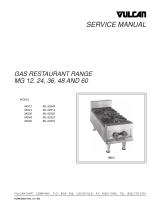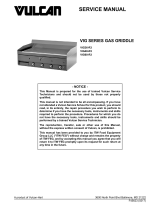
GENERAL
GENERAL
The griddle and its parts are hot. Use care when operating, cleaning or servicing the griddle.
INTRODUCTION
This Service Manual covers specific service
information related to the models listed on the front
cover and built after March 2010.
Procedures in this manual will apply to all 900RX
models unless specified. No procedure in this
manual will require the removal or raising of the
griddle plate. Pictures and illustrations can be of any
model unless the picture or illustration needs to be
model specific.
MSA griddles have a standing pilot that must be lit
manually. One pilot services two burners via a flame
tube between the burners. The 900RX utilizes a
spark ignition system that has a 'momentarily on'
switch - that means the switch must be held down for
sparking to take place, and it ceases sparking when
released.
The MSA and 900RX have BASO
®
pilot safety
valves that must be pressed to allow gas to feed the
pilot burner. For the 900RX, the pilot buttons must be
pressed at the same time the power switch is
pressed in order to light the pilot.
INSTALLATION
Generally, installations are made by the dealer or
contracted by the dealer or owner. Detailed
installation instructions are included in the
Installation and Operation Manual that is sent with
each unit. However, it should be noted that an
improperly installed unit, especially an unlevel unit
can lead to premature electrical component failures.
A unit that is higher in the front will cause the flue
gases to vent improperly and gather in the front near
the electrical components. All models must be
installed with an externally mounted regulator.
OPERATION
Detailed operation instructions are included in the
Installation & Operation Manual sent with each unit
and are also available at
WWW.VULCANHART.COM.
The 900RX models feature an electric ignition
system that is controlled by a momentary power
switch. The power switch turns the electric ignition
system off and on only and will only supply power to
the igniters when held down in the ON position. The
burners and pilots will continue to work with the
power switch in the OFF position until the gas supply
to the unit is cut off or the griddle gas shut-off valve
is turned to the OFF position. The pilots are
monitored by thermocouples and pilot safety valves.
If the pilot goes out, the safety valve will shut-off the
gas supply to the pilot and main burners. In the event
of a failure of the electronic ignition system, it is
possible to ignite the pilots with an outside source
(such as a lit taper). You will have to reach under the
front of the unit and through the pilot cutout to ignite
the pilots while again depressing the corresponding
red button.
CLEANING
Detailed cleaning procedures are included in the
Installation & Operation manual sent with each unit.
SPECIFICATIONS
Stainless steel front, sides and front top ledge. Fully
welded stainless and aluminized steel body frame.
11" low profile cooking height on 4" legs. 1" thick
polished steel griddle plate with 12 gage, 4" stainless
steel back and tapered side splashes. Grease chute
is fully welded to stop grease migration.
One 27,000 BTU/hr. “U” shaped aluminized steel
burner and mechanical snap action thermostat for
each 12" of griddle width. Chrome thermostat knob
guards. Temperature adjusts from 200° to 550° F.
One pilot safety for every two burners. Manual
shut-off valve. 3½" wide stainless steel grease
trough. 120V 50/60Hz 1 Amp single phase electric
ignition circuit. Plug type is NEMA 5-15 USA. ¾"
rear gas connection and gas pressure regulator.
A gas pressure regulator supplied with the unit must
be installed.
Check and set the gas pressure after the regulator is
installed.
Manifold pressure should be:
Natural Gas 4.0" W.C.
Propane Gas 10.0" W.C.
Incoming pressure should be 5-9" W.C. for Natural
Gas and 11.0" W.C. for Propane Gas.
Incoming pressure should not exceed 14.0" W.C.
F25383 (510)Page 3 of 16

















